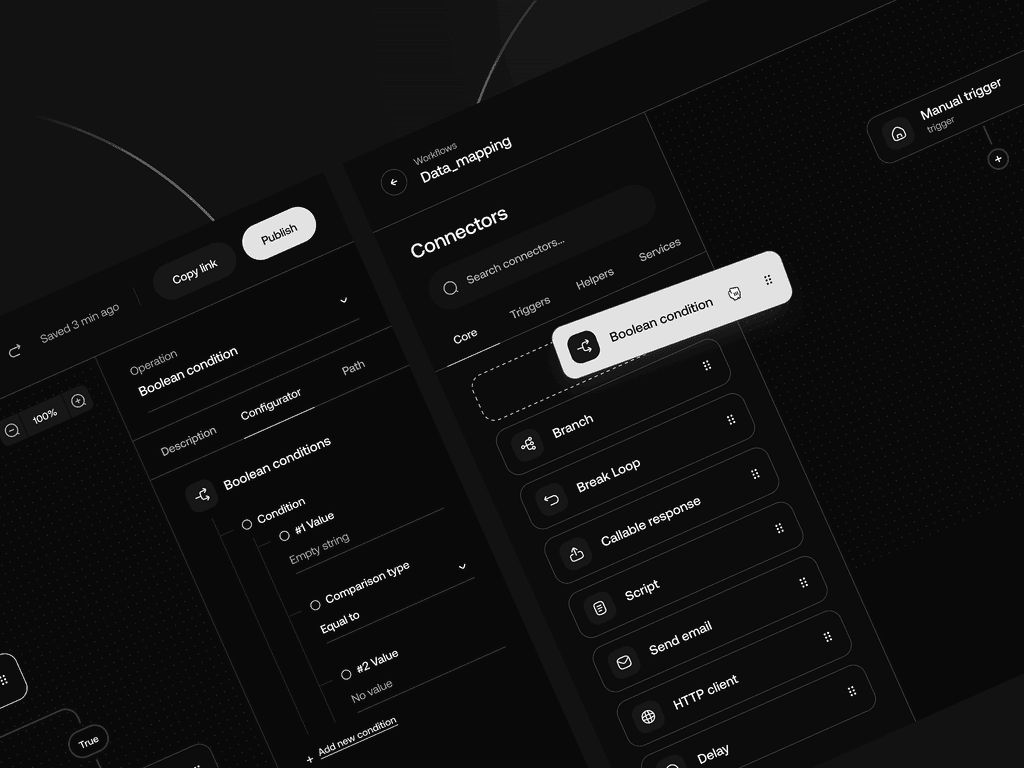
Blog
September 27, 2024
Top Tech Trends Shaping the Future of Startups in 2024

Blog
September 27, 2024
Top Tech Trends Shaping the Future of Startups in 2024
In the fast-paced world of technology, staying ahead of trends is crucial for startups aiming to disrupt markets and drive innovation. As we move through 2024, several key tech trends are emerging that promise to shape the landscape for startups. Here, we explore these trends and how startups can leverage them to gain a competitive edge.
1. Artificial Intelligence and Machine Learning
Overview:
Artificial Intelligence (AI) and Machine Learning (ML) continue to be at the forefront of technological innovation. In 2024, these technologies are becoming more accessible and integrated into various aspects of business operations.
Key Developments:
• Automated Customer Service: Advanced chatbots and virtual assistants are becoming more sophisticated, providing efficient and personalized customer interactions.
• Predictive Analytics: Startups are using AI to analyze vast amounts of data to predict market trends, customer behavior, and optimize operations.
• AI-Driven Product Development: From software development to product design, AI is helping startups innovate faster and more efficiently.
How to Leverage:
Startups should invest in AI and ML to automate processes, enhance decision-making, and improve customer experiences. Partnering with AI-focused tech providers or incorporating AI tools into their platforms can yield significant benefits.
2. The Rise of Remote Work Technologies
Overview:
The pandemic accelerated the shift to remote work, and in 2024, remote work technologies are evolving to support more dynamic and flexible work environments.
Key Developments:
• Virtual Collaboration Tools: Enhanced features in tools like Zoom, Microsoft Teams, and Slack are making remote collaboration more seamless.
• Virtual and Augmented Reality: VR and AR are being used for virtual meetings, training, and even remote project management.
• Cybersecurity Solutions: With remote work comes increased cybersecurity risks. Startups are investing in advanced security measures to protect data and ensure compliance.
How to Leverage:
Startups should adopt robust remote work tools and establish strong cybersecurity protocols. Offering flexible work options can also attract top talent who value work-life balance.
3. Sustainable Tech and Green Initiatives
Overview:
Sustainability is becoming a priority for businesses and consumers alike. Startups that incorporate green technologies and sustainable practices are gaining favor in the market.
Key Developments:
• Renewable Energy Solutions: Startups are developing and adopting technologies that rely on renewable energy sources.
• Eco-Friendly Products: There is a growing demand for products that are sustainably sourced and have a minimal environmental impact.
• Circular Economy: Innovations in recycling, upcycling, and waste reduction are creating new business models focused on sustainability.
How to Leverage:
Integrating sustainability into your business model can attract eco-conscious customers and investors. Look for ways to minimize your environmental footprint through energy-efficient operations and sustainable product offerings.
4. Advanced Funding and Investment Platforms
Overview:
The landscape of startup funding is evolving with new platforms and models that make it easier for startups to secure investment.
Key Developments:
• Crowdfunding: Platforms like Kickstarter and Indiegogo continue to grow, allowing startups to raise funds directly from consumers.
• Equity Crowdfunding: Sites like Seedrs and Crowdcube enable startups to offer equity in exchange for investment from a large pool of investors.
• Decentralized Finance (DeFi): Blockchain technology is paving the way for new financing options through decentralized finance platforms.
How to Leverage:
Startups should explore various funding options to find the best fit for their needs. Engaging with multiple platforms can increase visibility and access to a broader investor base.
5. HealthTech and Biotech Innovations
Overview:
HealthTech and Biotech are experiencing rapid advancements, driven by the need for improved healthcare solutions and personalized medicine.
Key Developments:
• Telemedicine: The use of telehealth services has expanded, providing remote consultation and treatment options.
• Personalized Medicine: Advances in genomics and biotechnology are enabling personalized treatment plans tailored to individual patients.
• Health Monitoring Devices: Wearable technology and IoT devices are providing real-time health data, improving patient outcomes and preventive care.
How to Leverage:
Startups in the healthcare sector should focus on integrating technology to offer innovative solutions that improve patient care. Partnerships with healthcare providers and investment in R&D can drive growth and innovation.
Conclusion
The technological landscape in 2024 is ripe with opportunities for startups willing to embrace innovation. By staying abreast of these trends and strategically incorporating them into their business models, startups can position themselves for success in an increasingly competitive market. At Venturest, we are committed to helping startups navigate these trends and connect with the right solutions to achieve their goals. Whether through AI-driven insights, sustainable practices, or cutting-edge funding platforms, the future of startups looks promising and full of potential.
For more insights and support on leveraging these trends, reach out to us at Venturest on LinkedIn.
1. Artificial Intelligence and Machine Learning
Overview:
Artificial Intelligence (AI) and Machine Learning (ML) continue to be at the forefront of technological innovation. In 2024, these technologies are becoming more accessible and integrated into various aspects of business operations.
Key Developments:
• Automated Customer Service: Advanced chatbots and virtual assistants are becoming more sophisticated, providing efficient and personalized customer interactions.
• Predictive Analytics: Startups are using AI to analyze vast amounts of data to predict market trends, customer behavior, and optimize operations.
• AI-Driven Product Development: From software development to product design, AI is helping startups innovate faster and more efficiently.
How to Leverage:
Startups should invest in AI and ML to automate processes, enhance decision-making, and improve customer experiences. Partnering with AI-focused tech providers or incorporating AI tools into their platforms can yield significant benefits.
2. The Rise of Remote Work Technologies
Overview:
The pandemic accelerated the shift to remote work, and in 2024, remote work technologies are evolving to support more dynamic and flexible work environments.
Key Developments:
• Virtual Collaboration Tools: Enhanced features in tools like Zoom, Microsoft Teams, and Slack are making remote collaboration more seamless.
• Virtual and Augmented Reality: VR and AR are being used for virtual meetings, training, and even remote project management.
• Cybersecurity Solutions: With remote work comes increased cybersecurity risks. Startups are investing in advanced security measures to protect data and ensure compliance.
How to Leverage:
Startups should adopt robust remote work tools and establish strong cybersecurity protocols. Offering flexible work options can also attract top talent who value work-life balance.
3. Sustainable Tech and Green Initiatives
Overview:
Sustainability is becoming a priority for businesses and consumers alike. Startups that incorporate green technologies and sustainable practices are gaining favor in the market.
Key Developments:
• Renewable Energy Solutions: Startups are developing and adopting technologies that rely on renewable energy sources.
• Eco-Friendly Products: There is a growing demand for products that are sustainably sourced and have a minimal environmental impact.
• Circular Economy: Innovations in recycling, upcycling, and waste reduction are creating new business models focused on sustainability.
How to Leverage:
Integrating sustainability into your business model can attract eco-conscious customers and investors. Look for ways to minimize your environmental footprint through energy-efficient operations and sustainable product offerings.
4. Advanced Funding and Investment Platforms
Overview:
The landscape of startup funding is evolving with new platforms and models that make it easier for startups to secure investment.
Key Developments:
• Crowdfunding: Platforms like Kickstarter and Indiegogo continue to grow, allowing startups to raise funds directly from consumers.
• Equity Crowdfunding: Sites like Seedrs and Crowdcube enable startups to offer equity in exchange for investment from a large pool of investors.
• Decentralized Finance (DeFi): Blockchain technology is paving the way for new financing options through decentralized finance platforms.
How to Leverage:
Startups should explore various funding options to find the best fit for their needs. Engaging with multiple platforms can increase visibility and access to a broader investor base.
5. HealthTech and Biotech Innovations
Overview:
HealthTech and Biotech are experiencing rapid advancements, driven by the need for improved healthcare solutions and personalized medicine.
Key Developments:
• Telemedicine: The use of telehealth services has expanded, providing remote consultation and treatment options.
• Personalized Medicine: Advances in genomics and biotechnology are enabling personalized treatment plans tailored to individual patients.
• Health Monitoring Devices: Wearable technology and IoT devices are providing real-time health data, improving patient outcomes and preventive care.
How to Leverage:
Startups in the healthcare sector should focus on integrating technology to offer innovative solutions that improve patient care. Partnerships with healthcare providers and investment in R&D can drive growth and innovation.
Conclusion
The technological landscape in 2024 is ripe with opportunities for startups willing to embrace innovation. By staying abreast of these trends and strategically incorporating them into their business models, startups can position themselves for success in an increasingly competitive market. At Venturest, we are committed to helping startups navigate these trends and connect with the right solutions to achieve their goals. Whether through AI-driven insights, sustainable practices, or cutting-edge funding platforms, the future of startups looks promising and full of potential.
For more insights and support on leveraging these trends, reach out to us at Venturest on LinkedIn.
In the fast-paced world of technology, staying ahead of trends is crucial for startups aiming to disrupt markets and drive innovation. As we move through 2024, several key tech trends are emerging that promise to shape the landscape for startups. Here, we explore these trends and how startups can leverage them to gain a competitive edge.
1. Artificial Intelligence and Machine Learning
Overview:
Artificial Intelligence (AI) and Machine Learning (ML) continue to be at the forefront of technological innovation. In 2024, these technologies are becoming more accessible and integrated into various aspects of business operations.
Key Developments:
• Automated Customer Service: Advanced chatbots and virtual assistants are becoming more sophisticated, providing efficient and personalized customer interactions.
• Predictive Analytics: Startups are using AI to analyze vast amounts of data to predict market trends, customer behavior, and optimize operations.
• AI-Driven Product Development: From software development to product design, AI is helping startups innovate faster and more efficiently.
How to Leverage:
Startups should invest in AI and ML to automate processes, enhance decision-making, and improve customer experiences. Partnering with AI-focused tech providers or incorporating AI tools into their platforms can yield significant benefits.
2. The Rise of Remote Work Technologies
Overview:
The pandemic accelerated the shift to remote work, and in 2024, remote work technologies are evolving to support more dynamic and flexible work environments.
Key Developments:
• Virtual Collaboration Tools: Enhanced features in tools like Zoom, Microsoft Teams, and Slack are making remote collaboration more seamless.
• Virtual and Augmented Reality: VR and AR are being used for virtual meetings, training, and even remote project management.
• Cybersecurity Solutions: With remote work comes increased cybersecurity risks. Startups are investing in advanced security measures to protect data and ensure compliance.
How to Leverage:
Startups should adopt robust remote work tools and establish strong cybersecurity protocols. Offering flexible work options can also attract top talent who value work-life balance.
3. Sustainable Tech and Green Initiatives
Overview:
Sustainability is becoming a priority for businesses and consumers alike. Startups that incorporate green technologies and sustainable practices are gaining favor in the market.
Key Developments:
• Renewable Energy Solutions: Startups are developing and adopting technologies that rely on renewable energy sources.
• Eco-Friendly Products: There is a growing demand for products that are sustainably sourced and have a minimal environmental impact.
• Circular Economy: Innovations in recycling, upcycling, and waste reduction are creating new business models focused on sustainability.
How to Leverage:
Integrating sustainability into your business model can attract eco-conscious customers and investors. Look for ways to minimize your environmental footprint through energy-efficient operations and sustainable product offerings.
4. Advanced Funding and Investment Platforms
Overview:
The landscape of startup funding is evolving with new platforms and models that make it easier for startups to secure investment.
Key Developments:
• Crowdfunding: Platforms like Kickstarter and Indiegogo continue to grow, allowing startups to raise funds directly from consumers.
• Equity Crowdfunding: Sites like Seedrs and Crowdcube enable startups to offer equity in exchange for investment from a large pool of investors.
• Decentralized Finance (DeFi): Blockchain technology is paving the way for new financing options through decentralized finance platforms.
How to Leverage:
Startups should explore various funding options to find the best fit for their needs. Engaging with multiple platforms can increase visibility and access to a broader investor base.
5. HealthTech and Biotech Innovations
Overview:
HealthTech and Biotech are experiencing rapid advancements, driven by the need for improved healthcare solutions and personalized medicine.
Key Developments:
• Telemedicine: The use of telehealth services has expanded, providing remote consultation and treatment options.
• Personalized Medicine: Advances in genomics and biotechnology are enabling personalized treatment plans tailored to individual patients.
• Health Monitoring Devices: Wearable technology and IoT devices are providing real-time health data, improving patient outcomes and preventive care.
How to Leverage:
Startups in the healthcare sector should focus on integrating technology to offer innovative solutions that improve patient care. Partnerships with healthcare providers and investment in R&D can drive growth and innovation.
Conclusion
The technological landscape in 2024 is ripe with opportunities for startups willing to embrace innovation. By staying abreast of these trends and strategically incorporating them into their business models, startups can position themselves for success in an increasingly competitive market. At Venturest, we are committed to helping startups navigate these trends and connect with the right solutions to achieve their goals. Whether through AI-driven insights, sustainable practices, or cutting-edge funding platforms, the future of startups looks promising and full of potential.
For more insights and support on leveraging these trends, reach out to us at Venturest on LinkedIn.
Other Blogs
Other Blogs
Check our other project Blogs with useful insight and information for your businesses
Other Blogs
Other Blogs
Check our other project Blogs with useful insight and information for your businesses
Other Blogs
Other Blogs
Check our other project Blogs with useful insight and information for your businesses


